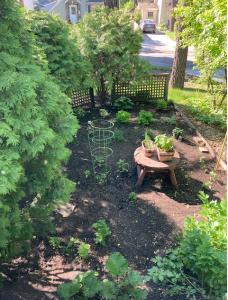We learn from our gardens to deal with the most urgent question of the time: How much is enough?
I returned to the garden this year. I imagine like many people who had maybe let their weeds grow a little long, or not put down roots yet where they are, you may find yourself now, at home, with much less distraction. Perhaps gardening had never left you. Perhaps you are one of the dedicated souls that diligently build and cultivate the soil every year. I personally needed a reminder to come back to the earth.
My earliest memories are of my childhood garden in my little town where my Dad kept our large garden faithfully, and I happily ate as many peas in the dirt as I could in a sitting. He was a talented gardener, he could grow pretty well anything in our Manitoba clay.
At Klinic I noticed immediately how gardening infuses the place. In spring there is happy chatter in every corner about people’s gardens. There are comparisons and advice, there are clippings being brought in and shared, there are plants. In the fall there is borscht. Gardening may be Klinic’s love language.
Margaret Atwood once said that, “Gardening is not a rational act.” Perhaps this is true, maybe it is in fact, an act of love, for self, and for others.
I have thought much of the metaphor of the garden over the past week, as I considered that my time with Klinic will soon be coming to a close. I have begun planting my garden in my new home. It has made me consider what seeds I will bring with me, and what I will leave behind. Last weekend I planted the Lupine seeds that a previous Director left for members of our leadership team on her departure, sharing the story of the Lupine Lady who wanted to make the world a more beautiful place by spreading Lupine seeds in the wild. Can we cultivate our own gardens and still take some time to throw some seed to the wind, to carry with us as we go?
I also planted the mixed seeds of our wellness committee from Blue Monday who distributed seeds to all of Klinic so that we could plant and cultivate our own gardens of hope (and I am hoping for lettuce!). I believe these ideas capture the essence of community health, create and cultivate an environment that supports individual needs for growth, then help it spread.
I know that as I watch these seeds bloom, just as I watch Klinic and the team continue to flourish, I will give thanks to this place and all that came before, and after, to make it the garden that it is, and will continue to be. Thank you to all of you for being a part of my Klinic journey. I know that I have been just one small seedling in this beautiful garden. I also look forward to taking some of these seeds you have shared on to my new garden, where they can continue to grow and spread.


